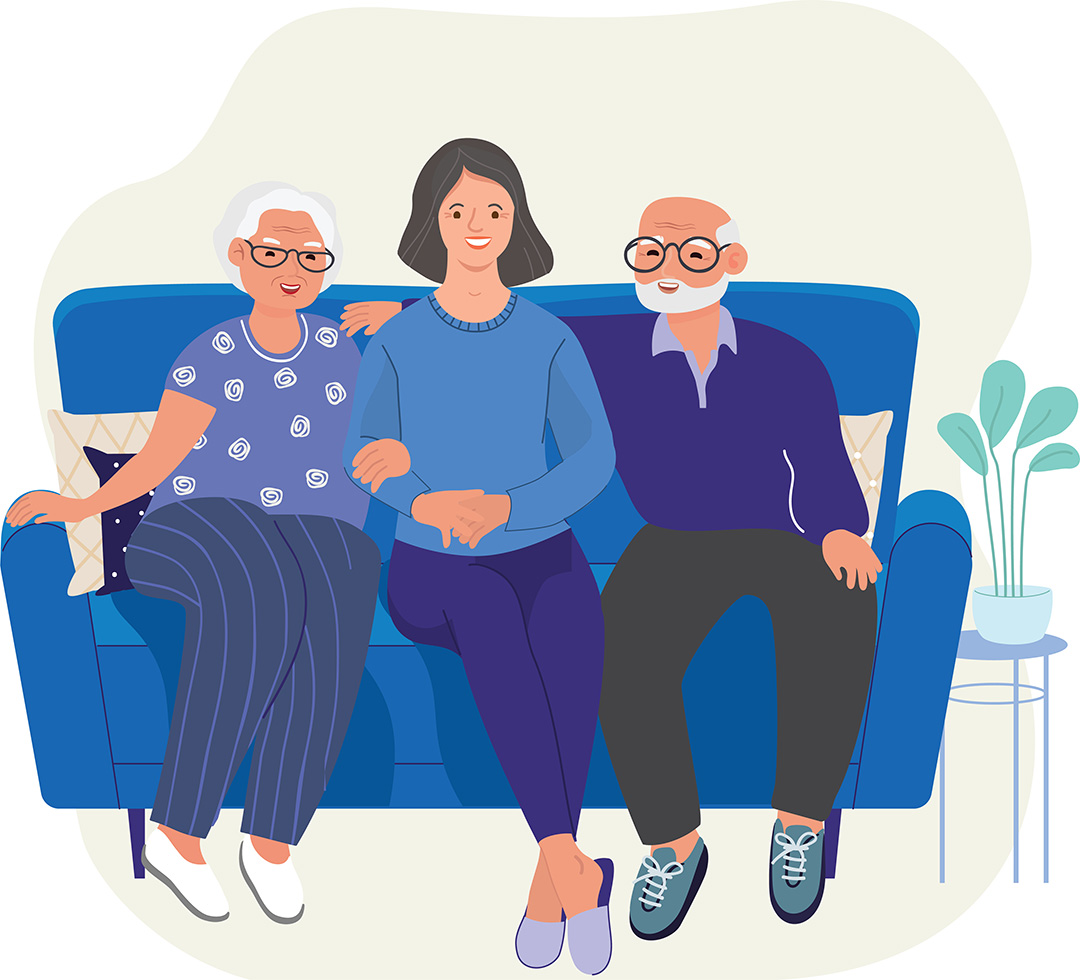70 Specific Signs It's Time to Consider Aged Care for Mum or Dad
The signs of aged care readiness | Signs that carers need support | Frequently asked questions
Updated 7th December 2023 | 4 minute read
Written by Jesse Gramenz  Reviewed by Julie Dymock
Reviewed by Julie Dymock 

When it comes time for a person to consider full time care in an aged care home, everyone is different. But short of going through any aged care assessment criteria, we've provided a list of early signs to keep an eye out to help you decide whether to take next steps.
Signs Mum and Dad might need aged care
Social Isolation
- Avoiding phone calls or video chats.
- Declining invitations for no apparent reason.
- No longer attending religious or community events.
- Lack of interest in family gatherings.
- Decreased communication with friends and neighbours.
- Not participating in group activities or hobbies.
- Withdrawing from volunteer roles or community service.
- Rarely leaving their living space or room.
- Not updating or engaging on social media platforms they previously used.
Mobility Issues
10. Holding onto walls or furniture while walking
11. Difficulty getting up from a seated position.
- Wearing shoes that are inappropriate for the weather or occasion.
- Unexplained limping or favouring one side.
- Avoiding stairs or inclines.
- Struggling to carry groceries or light objects.
- Difficulty turning or moving in bed.
- Reluctance to walk short distances they used to cover easily.
- Needing frequent rests during walks.
- Avoiding activities that require standing for extended periods.
Cognitive Challenges
- Forgetting the rules of games they used to play.
- Difficulty following multi-step instructions.
- Repeatedly misplacing everyday items.
- Struggling to recall recent events or conversations.
- Difficulty recognizing familiar faces.
- Frequently forgetting to turn off appliances.
- Overlooking safety precautions, like turning off the stove.
- Difficulty navigating familiar areas or routes.
- Struggling with basic tasks like setting the table or making a bed.
- Struggling to follow TV shows or movies.
Emotional and Behavioural Changes
- Increased irritability or frustration.
- Laughing or crying at inappropriate times.
- Displaying signs of paranoia or unwarranted suspicion.
- Decreased interest in personal appearance or grooming.
- Overreacting to minor problems or issues.
- Displaying a lack of empathy or understanding in social situations.
- Avoiding eye contact or appearing distant during conversations.
- Exhibiting signs of anxiety or panic in familiar settings.
- Showing signs of agitation or distress in the evenings, known as "sundowning."
- Becoming fixated on specific topics or events.
- Exhibiting signs of restlessness, like pacing or wringing hands.
- Sleeping at odd hours or experiencing significant changes in sleep patterns.
- Expressing unfounded fears or concerns.
- Becoming easily tearful or emotional without apparent triggers.
- Showing increased dependency or clinginess towards family members.
- Avoiding reflections in mirrors or becoming startled by their reflection.
- Expressing feelings of emptiness or lack of purpose.
- Expressing feelings of loneliness or sadness without a clear reason
Physical Health and Well-being
- Frequent complaints of new aches or pains.
- Wearing the same clothes for several days.
- Neglecting to take medications or taking incorrect doses.
- Unexplained weight gain or loss.
Personal Care and Hygiene
- Difficulty buttoning shirts or fastening zippers.
- Neglecting dental hygiene or wearing dirty glasses.
- Wearing mismatched socks or shoes.
- Overuse or underuse of personal care products, like deodorant or perfume.
- Difficulty managing personal grooming tasks, like shaving or nail care.
- Bathing less frequently or avoiding it altogether.
- Hair that appears unkempt or not recently washed.
- Using household items inappropriately, like using kitchen scissors for personal grooming.
- Wearing clothes with stains or odours.
Communication and Social Interaction
- Difficulty keeping track of days or dates.
- Avoiding direct questions or changing the subject frequently.
- Repeatedly checking the time or asking the same questions.
- Struggling to find the right words or finishing sentences.
- Writing illegible or disjointed notes or lists.
- Avoiding phone calls or turning off the phone to avoid conversations.
- Difficulty understanding jokes or sarcasm.
- Becoming easily overwhelmed in social settings or noisy environments.
- Withdrawing from or showing disinterest in news or current events.
- Writing notes to themselves but forgetting their purpose.
Signs carers need the support of aged care
It’s not just your parents that you should be keeping an eye on – your health and wellbeing as a carer matters too! While your loved ones might be showing early signs of requiring additional support, you might be as well.
Here’s some examples:
- You often feel overwhelmed, leading to unexpected emotional outbursts like crying or irritability over seemingly minor issues.
- You experience noticeable changes in your grooming habits or personal appearance, suggesting you're too overwhelmed or depressed to care for yourself.
- You frequently forget not only caregiving tasks but also personal duties, making you question your capabilities.
- You're leaning more on alcohol, cigarettes, or even drugs, trying to cope with the growing pressures.
- The state of your home shows signs of neglect, making you feel you can't manage both caregiving and household duties.
- Your friendships and family relationships are suffering, as you withdraw or decline invitations to events you once enjoyed.
- The mere discussion of the person you're caring for becomes a sensitive topic, making you evasive or anxious.
- Your financial stress is building, with bills piling up, hinting at the growing burden of caregiving.
- Your once regular eating patterns are now erratic, either indulging too much or too little.
- You feel excessive guilt, second-guessing yourself, and constantly wonder if you're doing enough as a carer.
- You experience rapid weight fluctuations, indicating an underlying stress or health concern.
- Your immune system seems compromised, making you more susceptible to colds or other illnesses.
- You exhibit signs of physical strain, such as aches, pains, or headaches without a clear cause.
- Concentrating on tasks, even simple ones, becomes a challenge, affecting your efficiency and decision-making.
- Your personal health and needs take a back seat, as the caregiving demands overshadow them.
- There's a feeling of losing control, making every day seem like an uphill battle.
Clinical Manager Julie says:
“When you take break it’s like you’re putting your own oxygen mask on before putting it on the person next to you. Making sure you’re ok first isn’t selfish – it's the most practical thing you can do!” |
Read on:
- Take a break with short term care & respite care
- Look into nursing support at home with home care
Parting Thoughts
Making yourself aware of the signs of needing extra support (whether that’s for your or your parents) is the first step into being realistic about whether you need extra help at all. The next step? Talking to the experts.
- Consult with a health professional such as a GP (they can help you with the next step)
- Get an ACAT assessment
- Explore our comprehensive aged care services
Other questions you might have about aged care
Not what you're looking for? Check out our frequently asked questions below:
How do I approach an 'aged care chat' with Mum or Dad?
> The 2 main things to consider when chatting with Mum & Dad about aged care
What can I expect moving into aged care?
> What aged care is 'actually' like
Is 'aged care' actually the right choice?
Aged care isn't a one-size-fits-all solution. It's essential to evaluate if it aligns with the senior's desires, needs, and lifestyle. Engaging in introspective questions and seeking professional advice can provide clarity on how to decide if aged care is right for you.
> Explore options for care at home
What are the assessment criteria for aged care?
Still have questions?
- Home
- Residential Aged Care
- 70 Specific Signs It's Time to Consider Aged Care for Mum or Dad
Helpful Information
.jpg)
How to Talk About Aged Care With Your Parents

Staff and Qualifications
.jpg)